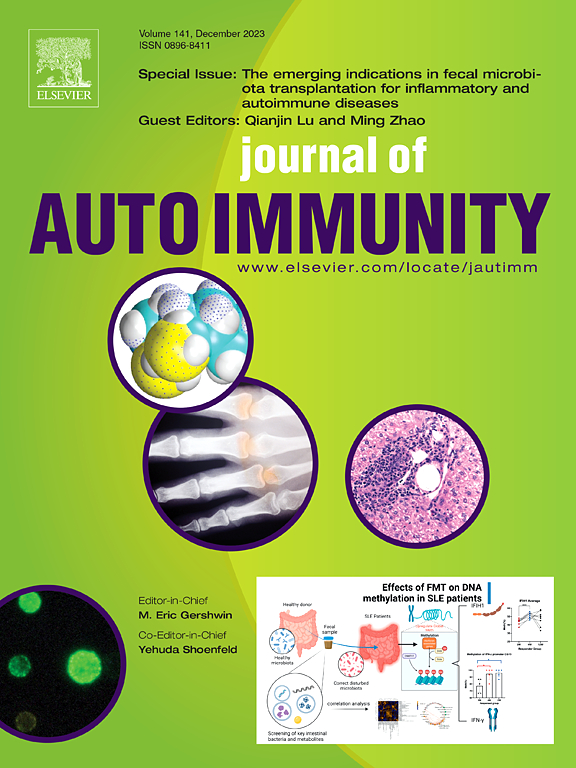炎症相关的肝脏NK细胞的一个新亚群调节原发性胆道胆管炎小鼠模型的免疫反应
IF 7
1区 医学
Q1 IMMUNOLOGY
引用次数: 0
摘要
原发性胆道胆管炎(PBC)是一种以胆管炎症为特征的慢性自身免疫性肝病,其发病机制以免疫失调为核心。在这里,我们发现了一个新的炎症相关自然杀伤(irNK)细胞亚群,其特征为CD49a+CXCR6−,在PBC小鼠模型和患者的肝脏中积累。单细胞RNA测序(scRNA-seq)和大量RNA测序显示,irNK细胞形成一个独特的簇,具有独特的基因表达谱,明显区别于传统NK细胞(cNK)和1型先天淋巴样细胞(ILC1s)。我们发现,irNK细胞在IL-15刺激下由cNK细胞产生,并获得肝脏驻留特征,包括循环减少,证实了它们的组织驻留身份。在功能上,irNK细胞通过TNF-α分泌促进CD4+ T细胞增殖,我们认为TNF-α是PBC小鼠模型(ARE-Del+/−小鼠;)。这些发现强调了irNK细胞在调节PBC免疫应答中的关键作用,并提示靶向这些细胞可能为自身免疫性肝病提供新的治疗机会。本文章由计算机程序翻译,如有差异,请以英文原文为准。
A novel subset of inflammation-related liver NK cells modulates immune responses in a murine model of primary biliary cholangitis
Primary biliary cholangitis (PBC) is a chronic autoimmune liver disease marked by bile duct inflammation, with immune dysregulation playing a central role in its pathogenesis. Here, we identify a novel subset of inflammation-related natural killer (irNK) cells, characterized by CD49a+CXCR6−, which accumulate in the livers of both PBC mouse models and patients. Single-cell RNA sequencing (scRNA-seq) and bulk RNA sequencing reveal that irNK cells form a distinct cluster with a unique gene expression profile, clearly distinguishing them from conventional NK (cNK) cells and type 1 innate lymphoid cells (ILC1s). We show that irNK cells arise from cNK cells in response to IL-15 stimulation and acquire liver-resident characteristics, including reduced circulation, confirming their tissue-resident identity. Functionally, irNK cells promote CD4+ T cell proliferation through TNF-α secretion, which we identify as the key mediator of immune dysregulation in the PBC murine model (ARE-Del+/− mice; ARE). These findings highlight the pivotal role of irNK cells in modulating immune responses in PBC and suggest that targeting these cells could offer new therapeutic opportunities for autoimmune liver diseases.
求助全文
通过发布文献求助,成功后即可免费获取论文全文。
去求助
来源期刊

Journal of autoimmunity
医学-免疫学
CiteScore
27.90
自引率
1.60%
发文量
117
审稿时长
17 days
期刊介绍:
The Journal of Autoimmunity serves as the primary publication for research on various facets of autoimmunity. These include topics such as the mechanism of self-recognition, regulation of autoimmune responses, experimental autoimmune diseases, diagnostic tests for autoantibodies, as well as the epidemiology, pathophysiology, and treatment of autoimmune diseases. While the journal covers a wide range of subjects, it emphasizes papers exploring the genetic, molecular biology, and cellular aspects of the field.
The Journal of Translational Autoimmunity, on the other hand, is a subsidiary journal of the Journal of Autoimmunity. It focuses specifically on translating scientific discoveries in autoimmunity into clinical applications and practical solutions. By highlighting research that bridges the gap between basic science and clinical practice, the Journal of Translational Autoimmunity aims to advance the understanding and treatment of autoimmune diseases.
 求助内容:
求助内容: 应助结果提醒方式:
应助结果提醒方式:


